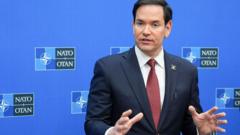The policy is part of a broader push to enforce immigration laws amid rising concerns over civil conflict in South Sudan.
US Revokes Visas for South Sudanese Amid Deportation Tensions

US Revokes Visas for South Sudanese Amid Deportation Tensions
Secretary of State Marco Rubio cites South Sudan's refusal to accept repatriated citizens as the reason.
In a bold move, U.S. Secretary of State Marco Rubio has announced the immediate revocation of visas for all South Sudanese passport holders. This action follows South Sudan's refusal to accept the return of its citizens who have been deported from the United States. In a statement released on Saturday, Rubio emphasized that this decision will also involve blocking entry for any new arrivals from South Sudan, which became the world’s newest nation in 2011.
Rubio attributed this strict measure to "the failure of South Sudan's transitional government to accept the return of its repatriated citizens in a timely manner." He further stated, "It is time for the Transitional Government of South Sudan to stop taking advantage of the United States," highlighting the obligation of countries to accept their citizens back when they are deported.
This clampdown comes amidst growing tensions in South Sudan, raising fears of a potential return to civil war. Recently, on March 8, the U.S. government ordered all non-emergency staff to evacuate South Sudan due to escalating regional clashes that threaten a fragile peace agreement established in 2018.
Previously, South Sudanese nationals in the U.S. had been granted Temporary Protected Status (TPS), allowing them to remain in the country for a designated period. However, this status is set to expire on May 3, leading to further uncertainty for many affected individuals.
The backdrop of this situation is a volatile history of violence in South Sudan. After gaining independence from Sudan in 2011, the nation spiraled into civil war just two years later. Factions led by President Salva Kiir and Vice-President Riek Machar clashed, resulting in an estimated 400,000 casualties. Although a peace deal was brokered in 2018, insufficient implementation, including delays in creating a new constitution and scheduling elections, has perpetuated instability across the country.
This revocation reflects an ongoing trend of the Trump administration's stringent stance on immigration and deportation policies, an issue that has caused friction with various international governments. For example, Colombian President Gustavo Petro recently halted U.S. military flights carrying deportees until a negotiated resolution was reached, showcasing the complexities around repatriation discussions.




















